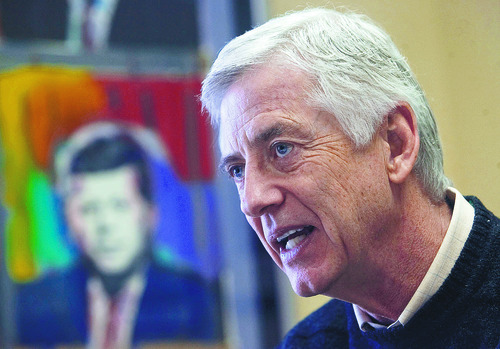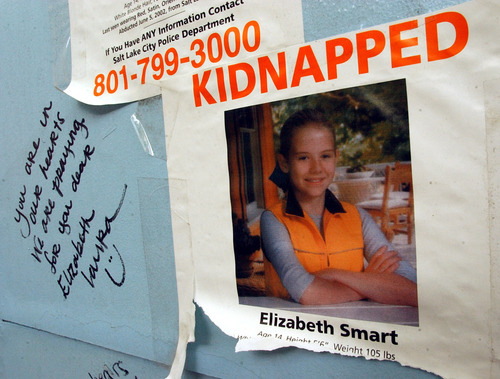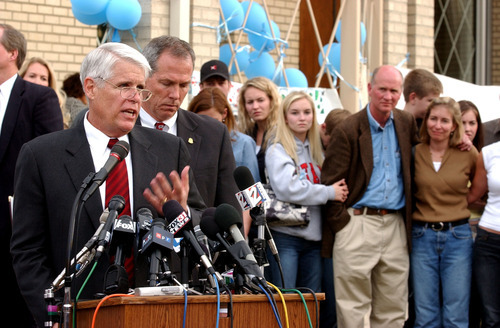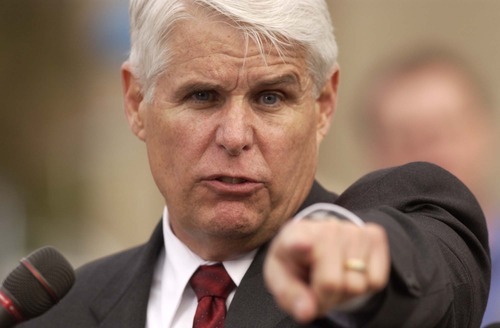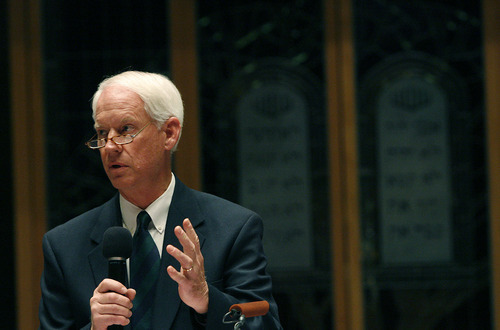This is an archived article that was published on sltrib.com in 2011, and information in the article may be outdated. It is provided only for personal research purposes and may not be reprinted.
Kidnap victim Elizabeth Smart had been home just five days in March 2003 when then-Salt Lake City Mayor Rocky Anderson appointed a committee to review how police performed during their search for her.
The committee quickly realized it could do little while the two suspects, Wanda Eileen Barzee and Brian David Mitchell, awaited trial and detectives and attorneys were prohibited from speaking about the case. So committee members said the review would begin when the cases were resolved. But eight years later, with Barzee in prison and Mitchell awaiting sentencing later this month, the committee is no more.
The committee's chairman, John T. Nielsen, said the issue is "moot" and there are no plans to convene after Mitchell's sentencing.
"The time has passed to such a degree that it would do no good to try to rehash that stuff," Nielsen told The Salt Lake Tribune last week. "The police department has changed dramatically. The leadership has changed. The procedures are different. I don't see any value now in going back now."
Current Mayor Ralph Becker said through a spokesman he agrees and has no plans to reconvene the committee.
But Anderson still wants a review conducted by the committee he appointed or another entity.
"I sure think this community is ill-served by the unanswered questions and the issue being dropped," Anderson told The Tribune in a recent interview.
Anderson said the police department still has not answered questions he posed in a memo to then-Chief Rick Dinse a few weeks before Elizabeth Smart's return. Among them: why police focused on Richard Ricci when the lone eyewitness in the abduction, Mary Katherine Smart, said it was not him, and how Salt Lake City police detectives pursued leads into Mitchell.
Also, the committee was supposed to look at more than the Smart kidnapping. Anderson also charged the committee with reviewing the Salt Lake Police Department investigations into a collection of homicides from the 1980s. Anderson had a personal stake in those cases, having represented the family of murder victim Lisa Strong when he was a private attorney. Police focused on a drifter who later served time in prison in Idaho. But in 1996, Forest Lee Whittle was convicted of Strong's murder.
Anderson thinks the Salt Lake City Police Department behaved in a similar manner in both the 1980s homicides and in the Smart abduction.
"They went public with their theory that had no supporting evidence and they were ignoring evidence that would have pointed to their perpetrator," Anderson said.
Dinse, in a Friday telephone interview with The Tribune, acknowledged he never answered all of Anderson's questions, but said that was because Barzee and Mitchell's criminal cases were pending and discussing some of those issues in a memo to the mayor "would not be appropriate." Dinse, who retired from the police department in 2006, said his department should have released a suspect sketch of Mitchell sooner, but he believes the department performed well overall. Reconvening the committee would reignite controversy, he said.
"I don't have any regrets regarding our focus on Ricci," Dinse said. "All the information we had, albeit it circumstantial, was extremely indicting."
Ricci died in prison while there on a parole violation before a burglary trial.
The committee did do some work on the Smart case. Nielsen, who before recently retiring had been an attorney for Salt Lake City government, a prosecutor and director of the Utah Department of Public Safety, met with police department administrators. In June 2006, Nielsen wrote other committee members a letter saying he believed "any investigative deficiencies" had been resolved. Nielsen's letter also pointed out that the police department had a new chief and that detectives who had a major role in the Smart case had retired or left the department.
Another reason a committee review was not necessary, Nielsen said, was the news reporting about problems with the search. That included the 2005 book by Tom Smart, who is Elizabeth Smart's uncle and a Deseret News photographer, and Lee Benson, a News columnist.
In their book, In Plain Sight: The Startling Truth behind the Elizabeth Smart Investigation, the authors say Salt Lake City police were slow to cordon the crime scene, focused on Ricci and dismissed other leads because they wanted the case closed, and that police detectives did not share some information with the FBI and ignored concerns from the Smart family.
One of the most dramatic testimonies in Mitchell's federal trial last year came from former Salt Lake City Police Detective Jon Richey, who two months after Smart's abduction, was called to the city library for a purported sighting of her. Smart was wearing a veil that Mitchell said would be sacrilegious to remove. Richey walked away without lifting the veil or asking for identification. It would be seven more months before police in Sandy found and identified Smart with Mitchell and Barzee.
On Friday, Tom Smart said he does not see a need for a review, given that the lead detectives and others involved in the investigation no longer work at the police department.
"As far as getting to the bottom of whose fault it was or anything like that, it is a moot case at this point," Tom Smart said. "What isn't a moot case is making sure it doesn't happen again."
And Tom Smart believes lessons have been learned from his niece's abduction, particularly about how to ask for the public's help in finding a missing person or the suspect. Tom Smart also called current Salt Lake City Police Chief Chris Burbank "a good chief."
Nielsen said he believes the Salt Lake City Police Department performed well during the search. Nielsen said there was good reason detectives focused on Ricci, who had a long criminal record and worked at and stole from the Smart home. When police began to consider Mitchell, the department made a "calculated determination" not to ask for public help and tip off Mitchell, Nielsen said.
"If they made any mistake, looking back, it is they didn't focus on Emmanuel soon enough," Nielsen said, referring to Mitchell by the name he called himself at the time of the abduction.
Andersonsaid the community has a vested interested in examining the police investigation.
"Everybody went through so much, including most of all Elizabeth and her family," Anderson said, "and if we're ever going to learn from these kinds of things , it needs to be disclosed and I think the public is entitled to disclosure of what was known and when."
Twitter: @natecarlisle —
Mitchell to be sentenced
Brian David Mitchell, 57, faces up to life in prison when U.S. District Judge Dale Kimball sentences him on May 25 in Salt Lake City.
A jury convicted Mitchell last year of kidnapping and unlawful transportation of a minor across state lines for the purposes of illegal sex.
Mitchell's wife and co-defendant, Wanda Eileen Barzee, 65, is currently serving a 15-year term at a federal prison in Texas for her part in Elizabeth Smart's June 2002 abduction. A federal court judge gave Barzee credit for the seven years she had already spent either at Utah State Hospital or the Salt Lake County jail.
Barzee's federal time is running concurrently with a one-to-15-year state conviction for the attempted kidnapping of Elizabeth's cousin in July 2002. Barzee will be eligible for state parole in 2018, but she could remain in prison until 2024.


